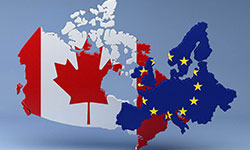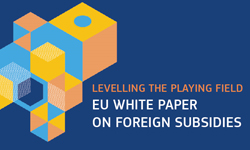BusinessEurope Headlines No. 2020-31
Circular economy business models need real markets

“In order to make the new Circular Economy Action Plan successful, we urgently need a functioning market for secondary raw materials and circular products”, said BusinessEurope Director General Markus J. Beyrer in a conversation with European Commissioner Virginijus Sinkevičius (Environment) at the World Circular Economy Forum on 29 September. “As shown on our website www.circulary.eu for example, companies are deploying new ‘product-as-a-service’ business models to extend the lifetime of their products. Important obstacles need to be overcome for this, such as consumer biases towards ownership, customer learning costs and legal challenges”, he added. For an overview of BusinessEurope’s updated positions on the new Circular Economy Action Plan, please see our dedicated comment paper.
![]() Contact: Leon de Graaf
Contact: Leon de Graaf
Our comment
EU-Canada trade agreement: three recommendations to achieve even more
By Eleonora Catella, Senior Adviser
 On 30 September, BusinessEurope participated in the EU-Canada Business Summit organised by the Canada-Europe Economic Chamber. The event took place only days after the third anniversary of the entry into force of the Comprehensive Economic Trade Agreement – CETA, which fell on 21 September.
On 30 September, BusinessEurope participated in the EU-Canada Business Summit organised by the Canada-Europe Economic Chamber. The event took place only days after the third anniversary of the entry into force of the Comprehensive Economic Trade Agreement – CETA, which fell on 21 September.
Bilateral trade between the EU and Canada in 2020 has been affected by the impact of the Covid-19 crisis, which has disrupted trade and regular supplies, unfortunately including protective equipment, due to the necessary quarantine and transport restrictions. Nevertheless, the balance of the first three years of implementation of CETA shows not only a positive trend, but also demonstrates that trade agreements provide an anchor of stability in times of uncertainties: the European Commission reports that “bilateral trade between the EU27 and Canada has increased by 27% for goods and 47% for services as compared to the situation before CETA entered into force” and highlights that this trend is much better than others between the EU and the rest of the world over the same period of time.
BusinessEurope has three recommendations going forward. The first one is on the need to furthering awareness of the opportunities opened up by the CETA among the European economic operators. In this regard, we praise the work of the European Commission and its efforts to publish a series of guides for economic operators already engaged or considering engaging in trade with Canada. The guides provide general information on CETA and how to do business in Canada, and also include practical details for companies, for example on finding a business partner. These are useful tools and business organizations and enterprises must continue cooperating with the Commission to ensure they receive accurate feedback which may be helpful for developing similar guides for further sectors and fine-tuning the existing tools if needed.
Secondly, a smooth and effective implementation of the agreement is important to ensure that the ratification process goes forward, at a time when many Member States have not yet ratified the agreement.
Thirdly, business organisations in both Europe and Canada must actively engage in the mechanisms established by CETA and provide for a specific role for civil society in monitoring the implementation of the agreement, like the Domestic Advisory Groups (DAGs). This is crucial to ensure that the economic dimension of sustainable development is taken into account in the debates that arise in those groups and that may have an impact on policy.
Contact: Eleonora Catella
Trading rules equal legal certainty for business
 “Companies depend on stable and predictable legal environments to thrive. It is always preferable to have basic rules than to have no rules at all. In this context, multilateral trading rules need to adjust to today’s trade and investment reality. However, this will be a challenging exercise and the EU needs to remain committed to the World Trade Organisation (WTO) reform and come up with concrete proposals either on its own or together with like-minded countries”, said Luisa Santos, Deputy Director General of BusinessEurope, in a panel debate on the reform of the WTO that was organised on 28 of September by the Jacques Delors Centre and the German Ministry of Foreign Affairs. The event also had the participation of Sabine Weyand, Director General of the European Commission’s Directorate General for Trade. “COVID-19 has accentuated the importance of closely monitoring trade restrictions, ensuring countries respect their international commitments and roll back export barriers. At the same time, it showed how important it is to have easier and cheaper access to products that are critical to fight the pandemic” Santos highlighted. She added that these, together with industrial subsidies, e-commerce, trade and climate and the dispute settlement are key priorities for European business.
“Companies depend on stable and predictable legal environments to thrive. It is always preferable to have basic rules than to have no rules at all. In this context, multilateral trading rules need to adjust to today’s trade and investment reality. However, this will be a challenging exercise and the EU needs to remain committed to the World Trade Organisation (WTO) reform and come up with concrete proposals either on its own or together with like-minded countries”, said Luisa Santos, Deputy Director General of BusinessEurope, in a panel debate on the reform of the WTO that was organised on 28 of September by the Jacques Delors Centre and the German Ministry of Foreign Affairs. The event also had the participation of Sabine Weyand, Director General of the European Commission’s Directorate General for Trade. “COVID-19 has accentuated the importance of closely monitoring trade restrictions, ensuring countries respect their international commitments and roll back export barriers. At the same time, it showed how important it is to have easier and cheaper access to products that are critical to fight the pandemic” Santos highlighted. She added that these, together with industrial subsidies, e-commerce, trade and climate and the dispute settlement are key priorities for European business.
Contact: Sofia Bournou
Key principles for transport of tomorrow
 BusinessEurope has recently published a position paper on upcoming transport initiatives as a response to the public consultation on the Sustainable and Smart Mobility Strategy (SSMS). With this position paper, BusinessEurope highlights the need of balanced solutions in order to achieve an efficient, sustainable and smart Transport Single Market which connects businesses, regions and citizens while contributing to the EU’s global competitiveness. The transport sector needs very comprehensive and consistent policies which focus on the paradigm shift offered by the two megatrends – greening and digitalisation of transport systems. In order to support the investments of transport towards more smart and sustainable solutions, the whole sector has to rely, among others things, on: research, development and deployment funding; digital solutions; demand-side measures; level playing field; barrier-free Single Market for all modes of transport. The position paper contains more of BusinessEurope key messages on making transport sector more efficient, modern, sustainable and competitive.
BusinessEurope has recently published a position paper on upcoming transport initiatives as a response to the public consultation on the Sustainable and Smart Mobility Strategy (SSMS). With this position paper, BusinessEurope highlights the need of balanced solutions in order to achieve an efficient, sustainable and smart Transport Single Market which connects businesses, regions and citizens while contributing to the EU’s global competitiveness. The transport sector needs very comprehensive and consistent policies which focus on the paradigm shift offered by the two megatrends – greening and digitalisation of transport systems. In order to support the investments of transport towards more smart and sustainable solutions, the whole sector has to rely, among others things, on: research, development and deployment funding; digital solutions; demand-side measures; level playing field; barrier-free Single Market for all modes of transport. The position paper contains more of BusinessEurope key messages on making transport sector more efficient, modern, sustainable and competitive.
![]() Contact: Caterina Fortuna
Contact: Caterina Fortuna
Generalised System of Preferences: how it can help in post-Covid recovery
 “Thanks to the stable access it provides to the EU market, the Generalised System of Preferences (GSP) will be an important tool to help partner countries recover from the COVID-19 crisis”, said Luisa Santos, Deputy Director General at BusinessEurope, at the GSP Stakeholder Forum on 29 September. The EU’s Generalised System of Preferences removes or reduces tariffs for products imported into the EU market from vulnerable developing countries. The event was organised by the European Commission to launch the EU GSP Hub Project, which aims at increasing the use of GSP. Santos was part of a roundtable discussion on the GSP’s role in supporting a post-COVID recovery, which brough together different representatives from business, beneficiary countries, the European Parliament and international organisations. “In the GSP reform process, we can explore ways to better seize the scheme’s unique capacity to link trade, sustainability and development. However, we need to make sure that it remains predictable, simple and stable to enable companies of all sized to benefit from it”, she added. “In this regard, sustainability is a key angle of the GSP, especially as we are in the midst of a digital and green transformation”, she concluded.
“Thanks to the stable access it provides to the EU market, the Generalised System of Preferences (GSP) will be an important tool to help partner countries recover from the COVID-19 crisis”, said Luisa Santos, Deputy Director General at BusinessEurope, at the GSP Stakeholder Forum on 29 September. The EU’s Generalised System of Preferences removes or reduces tariffs for products imported into the EU market from vulnerable developing countries. The event was organised by the European Commission to launch the EU GSP Hub Project, which aims at increasing the use of GSP. Santos was part of a roundtable discussion on the GSP’s role in supporting a post-COVID recovery, which brough together different representatives from business, beneficiary countries, the European Parliament and international organisations. “In the GSP reform process, we can explore ways to better seize the scheme’s unique capacity to link trade, sustainability and development. However, we need to make sure that it remains predictable, simple and stable to enable companies of all sized to benefit from it”, she added. “In this regard, sustainability is a key angle of the GSP, especially as we are in the midst of a digital and green transformation”, she concluded.
Contact: Sofia Bournou, Benedikt Wiedenhofer
BusinessEuropes comments on EU White Paper on foreign subsidies
 On 23 September, BusinessEurope submitted its contribution to the public consultation on the Commission’s White Paper on Foreign Subsidies. The White Paper presents several approaches that aim at addressing the distortions caused by foreign subsidies on the European Single Market with regards companies’ general market operation, the acquisitions of EU companies, public procurement procedures and access to EU funding. In its contribution, BusinessEurope welcomes the White Paper as the increased activity of foreign subsidised enterprises in the EU market in recent years has exposed several regulatory gaps not addressed by our existing instruments. To ensure its effectiveness and consistent application across the EU while minimising the burden on business, BusinessEurope calls for a streamlined instrument that focuses on major subsidies leading to significant distortions of the level playing field and has the European Commission as main competent authority. Moreover, the instrument must be non-discriminatory and compliant with the rules of the World Trade Organisation in order to keep the EU attractive for foreign investors and to avoid retaliation from third countries. Read BusinessEurope’s contribution to the public consultation.
On 23 September, BusinessEurope submitted its contribution to the public consultation on the Commission’s White Paper on Foreign Subsidies. The White Paper presents several approaches that aim at addressing the distortions caused by foreign subsidies on the European Single Market with regards companies’ general market operation, the acquisitions of EU companies, public procurement procedures and access to EU funding. In its contribution, BusinessEurope welcomes the White Paper as the increased activity of foreign subsidised enterprises in the EU market in recent years has exposed several regulatory gaps not addressed by our existing instruments. To ensure its effectiveness and consistent application across the EU while minimising the burden on business, BusinessEurope calls for a streamlined instrument that focuses on major subsidies leading to significant distortions of the level playing field and has the European Commission as main competent authority. Moreover, the instrument must be non-discriminatory and compliant with the rules of the World Trade Organisation in order to keep the EU attractive for foreign investors and to avoid retaliation from third countries. Read BusinessEurope’s contribution to the public consultation.
![]() Contact: Benedikt Wiedenhofer, Maurice Fermont
Contact: Benedikt Wiedenhofer, Maurice Fermont
Image copyright: European Commission
Calendar 
- 12-16 October: 18th European Week of Regions and Cities
- 19-22 October: EU Green Week
- 5-6 November: Third policy learning forum on upskilling pathways: a vision for the future
Reminder: please have a look at our privacy policy